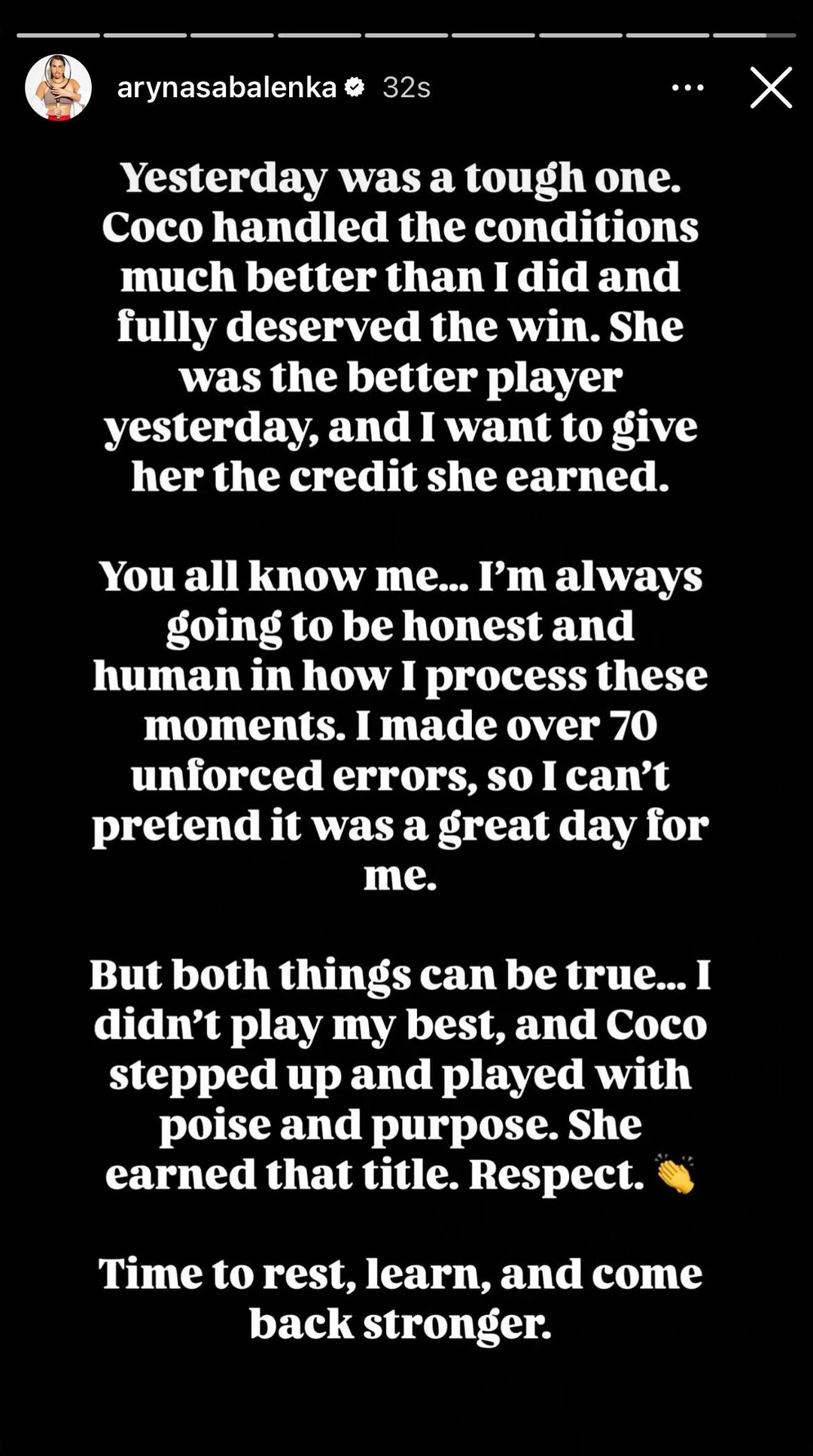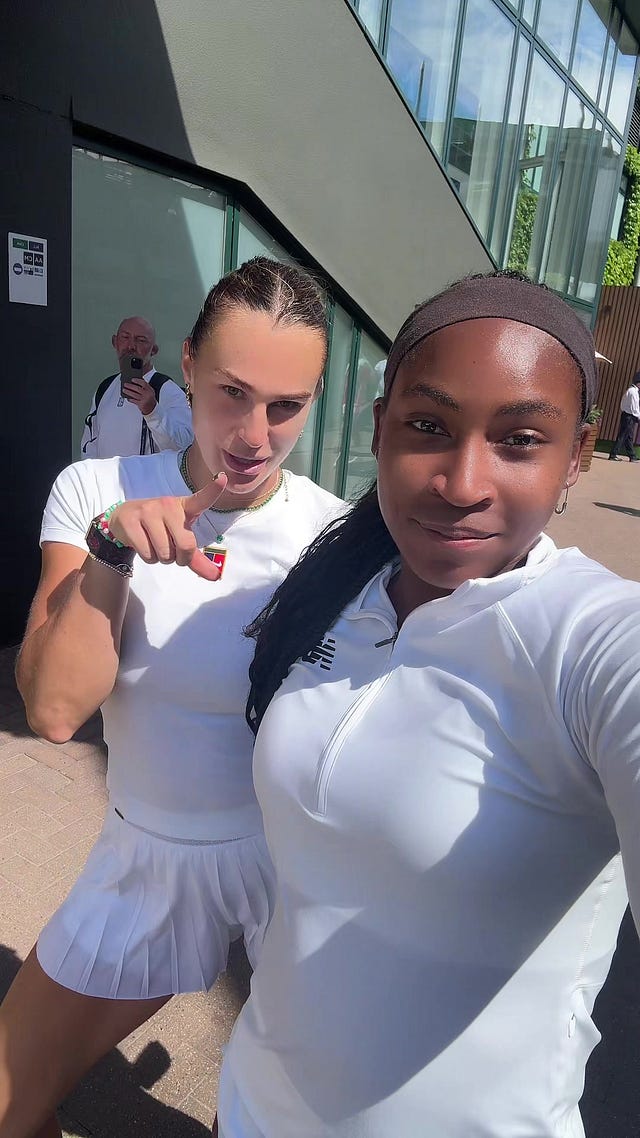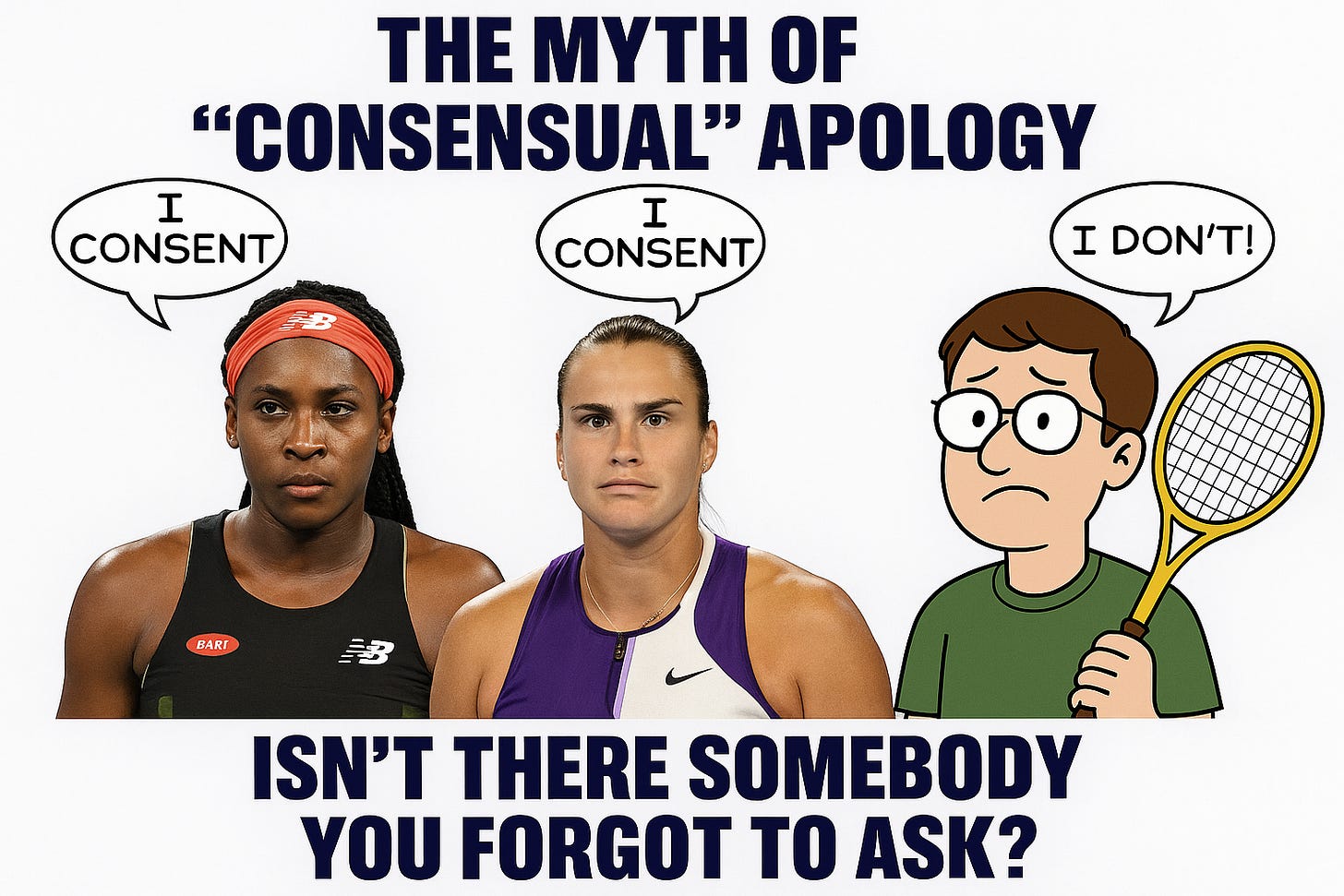Coco Gauff can accept an apology but her fans can’t
Are one-to-one apologies now impossible in the public sphere?
Coco Gauff is playing her first round Wimbledon match today, but the headlines have been more focused on an apology she recently received.
Coco is fresh off a resounding victory at the French Open, where she stunned world number one Aryna Sabalenka in the final. The match was not an instant classic like the men’s final the next day. It was gritty and raw. After losing the first set in a tense tie break, Coco simply refused to give up. She weathered the wind and nerves, pushed through Aryna’s wacks and wails, and chased down every ball, forcing her opponent to go for riskier and riskier shots that eventually splayed out of bounds.
By the end of the match, Coco’s shoes were streaked with the ruddy dirt of the court. Ringing the stadium where she raised her trophy is the Roland Garros quote that embodies its champions: “La victoire appartient au plus opiniâtre - Victory belongs to the most tenacious.”
The scandal happened after the match, when Sabalenka was ungracious in her post-match press conference, downplaying Coco’s victory at the expense of her own mistakes. She claimed Coco’s balls were “magically” landing in the court despite hitting the frame of her racquet, and that if Iga Świątek had made it to the final she would’ve beaten Coco.
“I think she won the match not because she played incredible,” Sabalenka said, “just because I made all of those mistakes from—like, if you look from the outside—kind of like from easy balls.”
The tennis community revolted. The discussion went viral on talk shows, podcasts—it broke out of the tennis bubble. Stephen A. Smith went on a rant.
Indeed, Sabalenka was obviously wrong. Anyone who knows anything about tennis can tell you that forcing your opponent to go big and miss balls is a strategy—and where Coco excels. She’s the world number two because she’s a world-class defender. Other notable defenders include Novak Djokovic and Rafael Nadal. Would anyone ever claim they didn’t “play incredible” when they won their matches? It hurt even worse to say this about Coco, who is perhaps the most beloved player in women’s tennis for her constant grace.
That grace came into play when Sabalenka started walking back her statements. It started the next day with an instagram story:
Better, but she still didn’t acknowledge that those 70 “unforced” errors were still to Coco’s credit. This statement only fueled the fire, and so Sabalenka later extended a real apology both directly to Coco and in an interview with Eurosport Germany:
That was just completely unprofessional of me. I let my emotions get the better of me. I absolutely regret what I said back then. You know, we all make mistakes. I’m just a human being who’s still learning in life. I think we all have those days when we lose control. But what I also want to say is that I wrote to Coco afterward – not immediately, but recently.
Still not the best apology, but the interesting and important thing is that Coco accepted it.
I'm not someone to hold a grudge. I was talking to my circle about it. I was like, ‘If she apologizes—not even publicly, it was just more so privately—I will be fine, and we'll move on. She did, and she did again when I saw her before we practiced. Yeah, it was just water under a bridge.
I know Aryna. I felt like before that, we got along pretty well, anyways, before all that happened, so it wasn't very hard to accept that apology. And, yeah, I understand things weren't, I guess, translated as how she meant it to be. And she understood that, and I understood that's not what she meant.
To show they’d made up, the pair made a couple of TikToks together:
 Tiktok failed to load.
Tiktok failed to load.Enable 3rd party cookies or use another browser
Coco’s caption was directed at her fans: “The olive branch was extended and accepted! we’re good so you guys should be too😂🤍"
But the fans were not good.

What’s so fascinating here is the collision and confusion of the public and private spheres. Apologies hold power in our private lives particularly when we know the person apologizing. If I apologize to a friend, they can recognize if I’m being sincere. They know my history, my ticks, my giveaways. A close friend can simply look at me the right way to indicate they are sorry—a stranger cannot. This is what it means to have a close relationship: you are better at detecting what someone really means, what is in their heart.
This is what Coco is referencing when she says “I know Aryna” and so “it wasn’t very hard to accept that apology.”
In the case of famous public figures, we sometimes confuse them for our friends. We think we know Coco and Aryna because we’re fans. And so when Aryna’s public apology seems deficient, the fans think they know better.
But think about how insane this is—imagine if one of the readers of my substack decided to weigh in on an apology I made to a friend for forgetting to pick him up at the airport as “not good enough” even if both of us had felt the apology was sufficient. We would say that person should mind their own business.
Because these are tennis stars, the private apology becomes everyone’s business.
Communications academics talk about four types of public apologies: one to one (A politician apologies to their wife for cheating on them), one to many (a politician apologizes to the city for embezzling funds), many to many (a politician apologies on behalf of their country for mistreating Native Americans) and many to one (a politician apologizes on behalf of a country for wrongfully imprisoning someone exonerated by DNA evidence).
This is where the confusion comes in: is this a one to one apology, where Aryna owes Coco an apology? Or is it a one to many, where Aryna owes the tennis community an apology? I’d argue the former, but the response indicates that we’ve been trained to think there are no such things as one to one public apologies anymore. The crowd demands their proper apology too.





